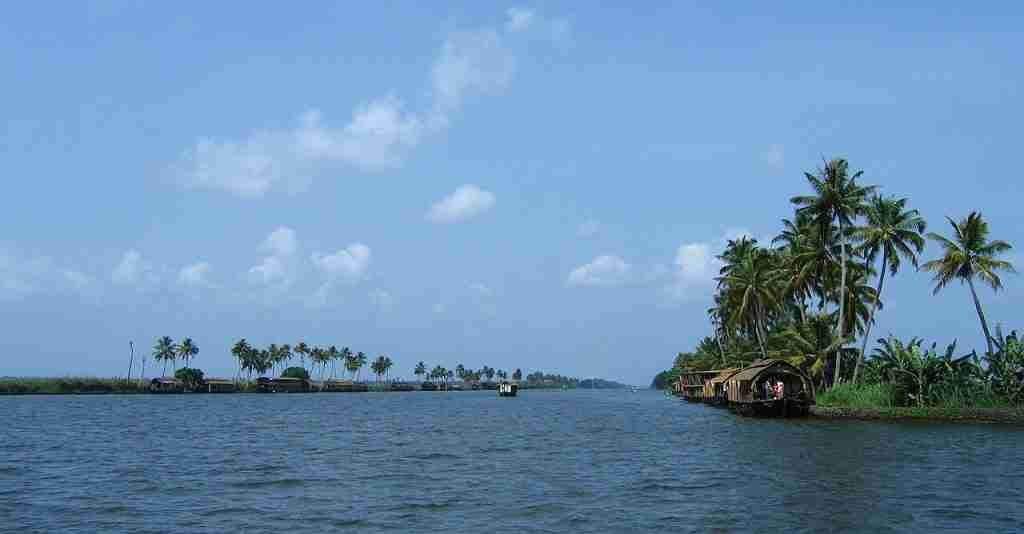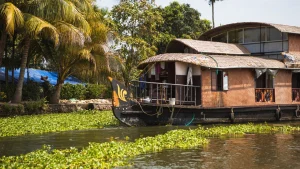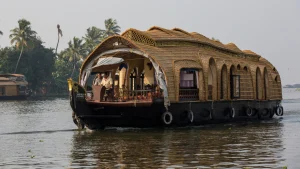Have you ever heard of Vembanad Lake? If not, you’re in for a treat! Nestled in the heart of Kerala, India, this lake is a gem that captures the essence of the state’s natural beauty and cultural richness. Whether you’re a nature lover, a history buff, or just someone looking to unwind, Vembanad Lake has something for everyone. So, let’s dive into what makes this lake so special!
What is Vembanad Lake, and What Makes It Famous?

Vembanad Lake is the longest lake in India and the largest in the state of Kerala. Stretching over 200 square kilometers, it spans multiple districts, including Alappuzha, Kottayam, and Ernakulam. The lake’s unique charm lies in its mix of saltwater and freshwater, making it a thriving hub for a diverse range of wildlife. While the northern part of the lake near Kochi has brackish water due to its connection to the Arabian Sea, the water becomes fresher as you move inland, especially during the monsoon season.
But it’s not just the size and unique water composition that make Vembanad Lake famous; it’s the breathtaking landscapes, the vibrant local culture, and the ecosystem that draws visitors from all over the world. One of the most iconic images associated with Vembanad Lake is that of the traditional Kerala houseboats, or kettuvallams, gently gliding through its serene waters. These houseboats are not just a tourist attraction; they’re a window into the slow-paced, tranquil way of life in Kerala. Imagine cruising along the lake, surrounded by lush greenery, with the gentle sound of water lapping against your boat—pure bliss!
Where Is It Located?
Vembanad Lake is located in the southern part of India, in the state of Kerala. It touches several districts, but Alappuzha (often called the “Venice of the East”) is the most popular gateway to the lake. The lake also extends into Kottayam, Ernakulam, and parts of Thrissur. If you’re planning a trip, Kochi (Cochin) is the nearest major city, and from there, it’s a short drive to this beautiful waterbody. The lake is a natural formation, but over time, human intervention, such as the construction of the Thanneermukkom Bund, has influenced its characteristics, particularly its salinity and water levels.
What Are the Specialties of Vembanad Lake?
Vembanad Lake is more than just a pretty sight. As part of Kerala’s extensive backwater network, it plays a crucial role in the local ecosystem. The lake is a biodiversity hotspot and is home to several species of fish, birds, and plants, some of which are unique to this region. The Kumarakom Bird Sanctuary, located on the lake’s eastern shore, is a paradise for bird lovers, where you can spot species like egrets, herons, and kingfishers, as well as rare migratory birds.
However, it’s important to note that the lake faces environmental challenges. Pollution from agricultural runoff, untreated sewage, and industrial waste has affected its water quality. While efforts are being made to address these issues, visitors should be aware that swimming in the lake is generally not recommended due to these pollution concerns and the presence of aquatic life, including fish and sometimes snakes. But if you really want to swim ask for the locals to find the perfect spot.
One of the specialties of Vembanad Lake is the famous Nehru Trophy Boat Race, held annually in August. This exhilarating event sees long snake boats, or chundan vallams, racing through the lake, with teams of rowers working in perfect harmony. The energy is palpable, and the spirit of competition is infectious—it’s a must-see if you’re visiting during this time!
A Glimpse into the History of Vembanad Lake

Vembanad Lake has a rich history that intertwines with the cultural and economic life of Kerala. Historically, the lake was a crucial part of the inland waterway trade routes, connecting different parts of Kerala with each other and with the rest of India. The lake’s backwaters were used for transporting goods, especially spices, which Kerala is famous for.
Over the years, the lake has also been at the heart of Kerala’s agrarian society. The paddy fields surrounding the lake, known as Kuttanad, are unique because they are below sea level and rely on the lake’s waters for irrigation. This region is often called the “Rice Bowl of Kerala,” and the connection between the lake and the fields is vital to the area’s agriculture.
Best Activities to Enjoy at Vembanad Lake
Now, let’s talk about the fun stuff! What can you do when you visit Vembanad Lake? Here are a few activities that should definitely be on your list:
- Houseboat Cruising: Spend a day (or more!) on a traditional Kerala houseboat. These floating homes come equipped with all the comforts, and the slow journey through the backwaters is incredibly relaxing.
- Bird Watching: The Kumarakom Bird Sanctuary, located on the banks of the lake, is a paradise for bird lovers. You can spot species like egrets, herons, and kingfishers, and if you’re lucky, you might even see a rare migratory bird.
- Fishing: If you enjoy fishing, Vembanad Lake is a great place to try your hand at catching some local fish. Many houseboats and resorts offer fishing as part of their packages.
- Visit the Pathiramanal Island: This small, lush island in the lake is perfect for a peaceful day trip. You can explore the island on foot, enjoy a picnic, or simply soak in the natural beauty.
- Attend the Nehru Trophy Boat Race: If your visit coincides with the event, don’t miss this thrilling boat race. The excitement of the crowd and the skill of the rowers make it an unforgettable experience.
Final Thoughts
Vembanad Lake is more than just a body of water; it’s a symbol of Kerala’s natural beauty, cultural richness, and tranquil lifestyle. While the lake faces challenges such as pollution, its natural wonders and cultural significance continue to shine through. Whether you’re there to relax on a houseboat, explore the local wildlife, or immerse yourself in the history and culture, Vembanad Lake offers a little bit of everything. So, when you’re planning your next getaway, why not head to Kerala and let Vembanad Lake sweep you off your feet? You won’t regret it!




